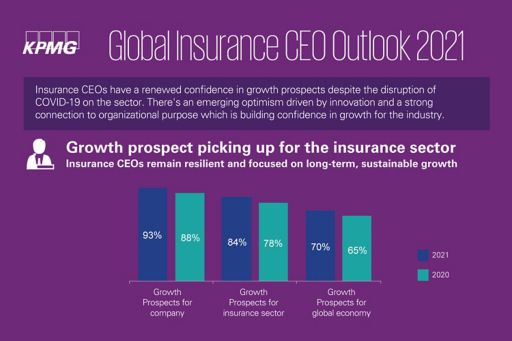The majority (96%) of global insurance CEOs who participated in the 2021 KPMG CEO Outlook survey indicated that the pandemic has accelerated the progress in the digitization of operations and the creation of a next-generation operating model. Fifty percent also indicated a sharp acceleration in the progress in the creation of a seamless customer experience, while 86% said that they use their corporate purpose to help drive action in addressing the needs of stakeholders.
Insurance CEOs address numerous critical issues currently affecting the insurance industry, including digital acceleration, customer experience, ESG, corporate purpose, growth, risks and the new normal.
Digital acceleration and the customer experience
50% of insurance CEOs noted that the pandemic has sharply accelerated progress in the area of creating a seamless digital customer experience, putting them years in advance of where they expected to be.
76% of insurance CEOs said that the pandemic has accelerated progress by a matter of months in the digitization of operations and the creation of a next-generation operating model; 20% said there was a sharp acceleration.
Insurance CEOs said they would invest more in the following three technologies:
- 68% said they will focus on customer-centric technologies such as chat bots
- 60% in data security measures
- 56% in digital communications such as video conferencing and messaging platforms
“Insurers realized that they need to modernize their systems if they’re going to survive,” said Ed Chanda, National Sector Lead, Insurance, KPMG LLP. “There is a need to improve the assessment of risk while meeting customer needs and expectations. In order to do that, insurers need to digitize their operations, receive and process information in a timely manner and deliver products in a cost-eective way.”
“Growth in insurance will come by serving smaller businesses,” added Chanda. “To do that, digitized platforms are needed to cost eectively collect and process data that underwriters can use to understand their needs and rapidly assess risk and price products.”
Environmental, Social, and Governance (ESG)
- 46% on insurance CEOs said that the United States re-entering the Paris Climate Agreement will cause their company to have more stringent ESG practices.
- 90% want to lock in the sustainability and climate change gains they have made during the pandemic.
- 98% said that their response to the pandemic has caused their focus to shift towards the social component of their ESG program.
- 60% said progress on diversity and inclusion has moved much too slowly in the business world.
- 90% percent said there is still a huge amount to do to build more diversity on boards.
“ESG is very important to insurers as it not only aects their customers and employees, but also how they design products and manage their portfolios ,” said Chanda. “Many new insurance products are greener and take into account social responsibility.”



Corporate purpose
- 86% of insurance CEOs said they used their corporate purpose to help drive action in addressing the needs of stakeholders.
- 98% percent feel a stronger emotional connection to their purpose since the pandemic began.

Growth prospects and risks
- The majority (94%) of insurance CEOs are confident about the growth prospects of their companies and the insurance industry. However, only 20% are con the growth prospects of the global economy.
- Moderate growth of 2.5-4.99% is expected in their organization’s earnings outlook over the next 3 years.
- In terms of risks that pose the greatest threat to their organization's growth, insurance CEOs outlined the below:
- 32% said that tax risk was the number one risk, followed by,
- Regulatory risk at 22%, and
- Interest rate risk at 20%.
“Insurers have been bullish for a few years about the growth prospects of their companies and the industry,” added Chanda. “They see 2020 as a pause to the trend followed by years of expansion. We expect growth in commercial lines and expanded oerings in the group and voluntary benefits space.”
“The tax landscape is changing rapidly as dierent countries consider – and in some cases have already enacted – reforms to protect their tax base. The need for reconciliation on an international level is becoming increasingly important,” said Chanda.
Insurance CEO response to pandemic
- 76% said they plan to further increase the use of digital collaboration and communication tools.
- 76% said that customer engagement and queries will be done predominantly via virtual platforms such as chat bots, social media, telephone and the website.
- 40% said the majority of employees will be working remotely between 2-3 days a week.
- Insurance CEOs took a range of steps to sustain corporate culture during the pandemic, including -
- 66% said they increased employee communication
- 44% said they increased visibility of leaders with employees
- 44% said they increased exibility of work hours

The New "Normal"


- 34% of insurance CEOs envision their company will return to a normal course of business sometime in year 2022, while 34% also said that their business has changed forever.
- In terms of the main triggers for their business to move to the new normal, insurance CEOs outlined the following:
- 60% pointed to an adoption rate in key markets – 50% plus of the population vaccinated.
- 60% said government in key markets encouraging business to return to “normal” – such as COVID-19 restrictions are lifted.
“The insurance business has changed forever because of the pandemic as we went through a year of doing things differently,” said Chanda. “Insurance will continue to evolve, but investment in modernizing processes and taking advantage of the opportunities technology provides is necessary for the industry to grow, and build products and services customers need and want.”
About the 2021 KPMG CEO Outlook survey
The 2021 KPMG CEO Outlook survey features insights from 500 CEOs at large global companies, of which 50 CEOs are from large global insurance organizations. Through helping other organizations mitigate risks and grasp opportunities, we can drive positive, sustainable change for clients, our people and society at large.
KPMG firms operate in 146 countries and territories, and in FY20, collectively employed close to 226,000 people, serving the needs of business, governments, public-sector agencies, not-for-profits and through KPMG firms' audit and assurance practices, the capital markets. KPMG is committed to quality and service excellence in all that we do, bringing our best to clients and earning the public's trust through our actions and behaviours both professionally and personally.
We lead with a commitment to quality and integrity across the KPMG global organization, bringing a passion for client success and a purpose to serve and improve the communities in which KPMG firms operate. In a world where rapid change and unprecedented disruption are the new normal, we inspire confidence and empower change in all we do.
KPMG Islands Group is a regional network of KPMG member firms providing Audit, Tax and Advisory services with more than 2,000 outstanding professionals working together to deliver value in Antigua & Barbuda, Bahamas, Barbados, Bermuda, British Virgin Islands, Cayman Islands, Guernsey, Isle of Man, Jamaica, Jersey, Malta, St Lucia, St Vincent & the Grenadines and Trinidad & Tobago.


